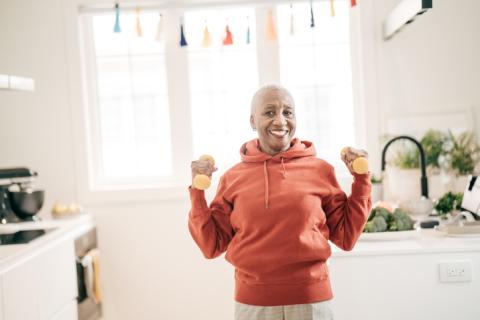Avoiding “Side Effects” of the Quarantine
Don’t neglect regular health care.
As the epidemic unfolded, many hospitals were overwhelmed with COVID-19 patients, and people were advised to stay away so personnel could focus on these desperately ill people, as well as preventing exposure to the virus. But now, many hospitals and medical practices are experiencing the opposite problem, as patients stay away from routine health appointments, and even delay treatment for serious health events such as stroke and heart attack. Washington University at St. Louis expert Dr. Akash Kansagra reports this his stroke care team has maintained full capacity to treat patients. “Nevertheless,” says Dr. Kansagra, “we have seen a smaller number of stroke patients coming to the hospital and some patients arriving at the hospital after a considerable delay. It is absolutely heartbreaking to meet a patient who might have recovered from a stroke but, for whatever reason, waited too long to seek treatment.”
And it’s important to continue your usual health care monitoring of diabetes, kidney disease, hypertension and other chronic conditions. Hospitals, clinics, doctor offices and dentists are taking stringent precautions to keep patients safe at this time. Many have implemented telemedicine visits for patients. Contact your healthcare provider right away if you have troublesome symptoms, or to make arrangements for your routine appointments.
Avoid dangerous sanitation practices.
We’re hearing plenty of reminders to clean, clean, clean at this time. Wash your hands frequently, and disinfect surfaces, especially high touch areas such as door handles and counter tops. Who can remember a Lysol shortage in the past? But these products aren’t without their dangers. The Centers for Disease Control and Prevention (CDC) reports an increase in calls to poison control hotlines relating to disinfectant products.
Some people have mixed products in a way that creates toxic fumes. Some have consumed or rinsed their mouths with products not intended for internal use. Other have received eye injuries. The CDC says, “To reduce improper use and prevent unnecessary chemical exposures, users should always read and follow directions on the label, only use water at room temperature for dilution (unless stated otherwise on the label), avoid mixing chemical products, wear eye and skin protection and ensure adequate ventilation.” And even if you are using these products frequently, be sure to put them away safely after each use, out of reach of children or people with dementia.
Don’t let nutrition standards drop.
There are multiple reasons that we might not eat well during this time. For one thing, we can’t go out to our favorite restaurant or make a leisurely trip to the grocery store. Many seniors are relying on family to shop for them, or trying to make very few trips. They’re eating more processed foods instead of fresh veggies and fruit—and these foods might be loaded with salt and unhealthy fats. Other seniors report that depression and anxiety have diminished their appetites. It’s no fun to eat alone, they say. Others are eating too much at this time. Food can be a comfort, but we’ll be decidedly less comfortable when we pack on extra pounds.
Seniors can still get fresh, healthy food through grocery delivery, takeout or delivery from restaurants, or delivered meal kits. Meal delivery programs are expanding as senior centers are shuttered. Senior living communities are delivering meals to residents’ rooms. And one more reminder: despite all the jokes about having that third “quarantini,” this is not a time to up our alcohol consumption.
Don’t take to the couch.
Inactivity is a major threat to senior wellness. Under normal circumstances, most older adult try to get some exercise. Some of us are more active than others, with a regular routine of aerobic, muscle strengthening and balance activities. Others might not take part in formal exercise, yet still get a fair amount of activity—walking to the store, visiting friends, gardening or cleaning the house.
Many of our habitual exercise sources might be off limits right now—the senior center, the gym, even the exercise room at our senior living community. But there’s plenty we can do instead. While observing the recommended social distancing, go out for a walk. If you are a gym member, ask if they offer virtual classes. Check out exercise videos. If you and a friend are exercise buddies, email each other reminders. And if you’re having frequent video chats with a friend or family member these days, mix it up with audio-only calls so you can do laps around the house while catching up on gossip.
